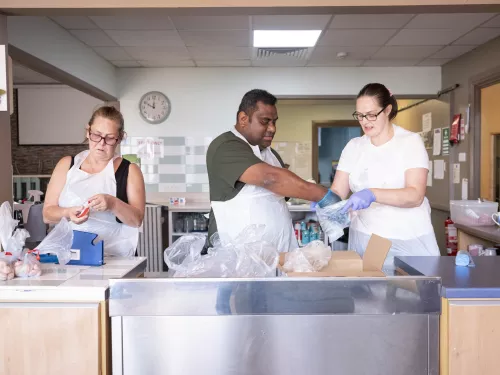Equity, diversity and inclusion
Equity, diversity and inclusion (EDI) are central to our work to end the need for food banks in the UK.

On this page:
To achieve our vision of a UK without the need for food banks, we must ensure people with lived experiences of poverty shape our work. This means doing our part in dismantling the structural discrimination that cuts across our society and leaves people struggling to get by.
What’s the link between EDI and food banks?
We know people need food banks when they don’t have enough money for the essentials:
- Some people are in-between jobs, have health conditions or are looking after relatives and children.
- Some people are in work that’s insecure or doesn’t pay enough to live on.
- Barriers like the lack of affordable childcare, transport, and flexible, accessible jobs are holding too many people back from opportunities to increase their income.
- High housing costs leave people without enough money for other things.
On top of this, the way our society works right now creates additional barriers for people with particular characteristics, and we know people at food banks are often facing these kinds of barriers too. For example, things like discrimination and health inequality can create extra barriers for people with protected characteristics like race and disability.
Our Hunger in the UK research shows us how these structural inequalities play themselves out:
- One in four (24%) people from an ethnic minority group experience food insecurity, almost twice the rate (13%) for white people.
- More than a quarter (26%) of disabled people experience food insecurity, nearly three times higher than the rate among non-disabled people (10%).
- Seven in 10 (69%) people referred to Trussell's community of food banks are disabled, and three in four (75%) have at least one disabled person in their household.
- Households with dependent children are more than twice as likely to experience food insecurity compared to of those without dependent children (23% vs. 11%). This rises to almost half (48%) of single adults who live with one or more dependent child.
- More than a quarter (27%) of people who are LGBTQ+ experience food insecurity, compared to 13% of people who are heterosexual.
We also know people aren’t one thing. No one is solely their ethnicity, gender, sexual orientation or disability. And we know most people at food banks will face multiple barriers because these characteristics come together and intersect, and our society has (often invisible) structures which limit people in different ways.
This isn’t right.
And it’s why meaningful diversity and inclusion work is core to our mission of ending the need for food banks.
Our work in EDI
We’ve introduced a number of changes to the way we work over the last five years, and we’ll keep working alongside communities and people with experience of poverty to ensure what we do is meaningful, clear and adopted by everyone we work with. So far we’ve:
The Disability Confident Scheme
As an employer we’ve always provided opportunities within Trussell for disabled staff and volunteers, from our charity retail shops through to our head office. We’ve sought to make reasonable adjustments for staff and people applying to work for us, all of our Senior Leadership Group are mental health first aiders, and we work with our wellbeing champions and healthcare provider to provide our team with extra support.
Through Disability Confident, we’re working towards:
Challenging attitudes
Increasing understanding of disability.
Equal opportunities
Ensuring disabled people can fulfil their full potential at Trussell.
Removing barriers
Providing access to disabled people and those with long-term conditions.
Our commitment
We can become a country where no one needs a food bank. But if we’re going to get there, we need to understand the inequality so many people face in the UK today, and confront the reasons why that inequality exists on a structural level. We’re committed to that challenge.
We’ll be updating this page with plans and progress, but if you have any questions or would like to find out more, please email us at inclusion@trussell.org.uk.